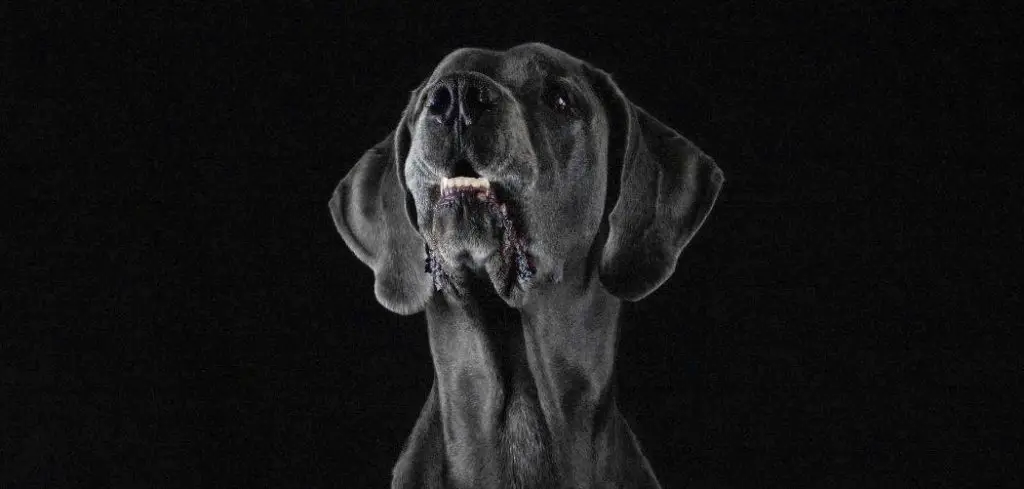Panting that occurs on and off at night can be concerning, especially when it interrupts your dog’s sleep or seems to appear without a clear trigger.
We outline the common reasons why a dog may pant on and off at night, what you can do at home, and when to seek veterinary help.
Dog Panting On and Off at Night — Why It Happens
When a dog pants on and off at night, they may be reacting to restlessness, discomfort, or anxiety. Heat, joint pain, digestive upset, or even nightmares can trigger nighttime panting cycles. In senior dogs, cognitive decline or heart disease may also play a role.

Dog Panting On and Off at Night: Common Causes
Anxiety and Nighttime Stress
Stress and anxiety are common reasons dogs pant intermittently at night. Dogs may experience separation anxiety, nighttime fears, or stress due to changes in their environment, which can lead to panting as a stress response.
Signs include restlessness, whining, pacing, trembling, or seeking comfort from owners.
Nighttime anxiety can also affect sleep patterns, leading to more frequent bouts of panting.
Creating a calm sleeping environment with consistent routines, a comfortable bed, and possibly calming aids can help reduce stress-induced panting.
Read more: Dog Panting On and Off (Here’s why)
Heat and Overheating
On-and-off panting at night can occur if your dog is too warm. Dogs do not sweat like humans and rely on panting to regulate body temperature.
A dog sleeping in a warm room or under heavy bedding may alternate between panting and resting.
Other signs of overheating include excessive drooling, reddened gums, lethargy, or a rapid heart rate. Providing proper ventilation, cooling mats, or light bedding helps your dog maintain a comfortable body temperature at night.
Pain or Discomfort
Intermittent panting at night may indicate underlying pain or discomfort. Dogs experiencing joint pain, arthritis, or mild injuries may pant when pain intensifies, especially after resting.
Accompanying behaviors might include shifting positions frequently, reluctance to lie down, whimpering, or changes in appetite. Proper pain management and veterinary evaluation are crucial for nighttime comfort and overall health.
Heart and Respiratory Conditions
Heart or lung issues can lead to intermittent panting during the night. Dogs with heart disease, congestive heart failure, or respiratory disorders may pant on and off depending on oxygen demands, posture, or nighttime stress.
Watch for coughing, exercise intolerance, difficulty lying flat, or fainting episodes. Prompt veterinary care can help manage these conditions and prevent nighttime distress.
Fever or Infection
Fever or low-grade infections may cause nighttime panting. Body temperature fluctuations during illness or inflammation can make dogs pant intermittently to regulate heat.
Other signs may include lethargy, reduced appetite, shivering, nasal discharge, or vomiting. Early veterinary intervention can detect infections and prevent more severe complications.
Gastrointestinal Upset
Digestive issues can trigger intermittent panting at night. Dogs with nausea, bloating, or minor gastrointestinal discomfort may display episodic panting along with restlessness or reluctance to lie down.
Additional signs may include vomiting, diarrhea, or abdominal sensitivity. Feeding bland diets, monitoring meal times, and consulting your veterinarian can help manage nighttime digestive discomfort.
Hormonal and Metabolic Disorders
Conditions like Cushing’s disease, hypothyroidism, or diabetes can contribute to intermittent nighttime panting. Hormonal imbalances may affect energy levels, sleep patterns, and respiratory control.
Observe for increased thirst, frequent urination, weight changes, or changes in coat condition. Diagnosis through blood tests and professional treatment plans are essential to maintain your dog’s nighttime comfort and overall health.
Medication Side Effects
Certain medications may result in nighttime panting. Drugs prescribed for pain, heart conditions, or anxiety can alter your dog’s breathing pattern or induce restlessness.
Monitor for panting episodes that coincide with medication schedules and consult your veterinarian if symptoms persist. Adjustments may improve your dog’s comfort while maintaining the effectiveness of treatment.
What to Do If Your Dog Is Panting On and Off at Night
Ensure your dog’s sleeping area is comfortable, quiet, and cool. Avoid heavy blankets or overly warm rooms that may cause overheating.
Observe and note when panting occurs, the duration, and any behaviors associated with it, such as shifting positions or whining. This diary can help your veterinarian identify patterns or underlying issues.
Maintain consistent bedtime routines to reduce anxiety, provide access to water, and allow a brief evening walk to relieve restlessness. Consider calming aids, such as pheromone diffusers or soft music, if anxiety appears to trigger panting.
If panting continues or worsens despite these measures, seek veterinary guidance to rule out medical causes like heart, respiratory, or metabolic conditions.
When to Call or Visit Your Vet
Seek immediate veterinary care if your dog shows:
Panting that is rapid, labored, or persistent
Weakness, fainting, or disorientation
Bluish, pale, or reddened gums
Vomiting, diarrhea, or refusal to eat
Signs of pain or sudden distress
Suspected ingestion of toxins
Early diagnosis and treatment can prevent serious complications and improve your dog’s quality of life.
Read more: Dog Panting and Tongue Out (Here’s why)
Key Takeaway
Intermittent panting at night in dogs may result from anxiety, overheating, pain, infections, gastrointestinal upset, hormonal imbalances, or medication side effects.
Monitoring your dog’s environment, behavior, and health, along with timely veterinary care, is essential.
By identifying triggers and addressing underlying causes, you can help your dog sleep comfortably and maintain overall health.
